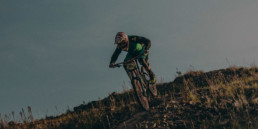Overcoming Objections to Freeriding
Many landowners believe freeriding equals reckless riding and off-trail rampages. They frequently oppose it and cite potential lawsuits, environmental damage and conflicts with other trail users as their reasons.
The good news is that mountain bikers can create challenging trails and bike parks that defy prejudiced views. Let’s break down the arguments that are used against freeriding, and look at effective strategies for countering them.
Objection: Fear Of Lawsuits
Landowners have valid concerns: In our litigious society, safety and exposure to liability cannot be taken lightly. The solution lies in careful planning and attention to risk management – taking a systemized approach to incorporating safety into the riding experience. A risk management program prevents injuries in the first place, builds your “defendability” in a court of law, and shuts down lawsuits before they start.
Objection: Environmental Concerns
Mountain biking, like all outdoor recreation, impacts the environment. Fortunately, there are techniques that help minimize these impacts. The solutions lie in environmentally sustainable trail planning, design, construction and maintenance, along with diligent visitor management techniques.
Objection: User Conflict
Examples of tension among those who recreate are easy to find: snowmobiling vs. cross country skiing; canoeing vs. motor boating; and skiing vs. snowboarding are just a few. The bottom line is that in most cases, the social conflicts involving mountain bikers and other trail users can be effectively managed. Bringing trail users together in the planning, building and management of trails is a powerful tool that will improve respect, tolerance and understanding. This cooperation will reduce conflict and may also yield higher quality trail designs and more successful management decisions.
Objection: Lack A Professional Proposal
People will take you and your proposed trail or freeriding facility more seriously when you present your ideas in a thorough, professional document. An effective trail proposal clearly outlines your goals and the benefits the project will bring to the community. Successful proposals also anticipate and answer questions that the community may have regarding your project.
Objection: Increased Injuries
Technically challenging trails may lead to bumps and bruises – or worse. Mountain biking is an inherently risky sport. The goal is to manage the risk, not eliminate it. Address concerns about injuries with careful trail design to reduce injury frequency, severity and consequences. Plan for emergencies and offer regularly scheduled skills clinics. Learn more about Managing Risk With Trail Design.
Objection: Building Without Permission
Before you can consider building a trail or adding technical features to an existing trail, you need to secure permission from the person who owns or manages the land. Be warned – gaining permission can be a complex and time-consuming process, but it yields great dividends for mountain bikers. The key is creating a cooperative relationship with the land manager and the local community based in mutual trust and respect.
The suggestions offered in this and other IMBA trailbuilding articles do not constitute a standard, specification, or regulation. Trailbuilders and landowners are responsible for the safety of their own trails and facilities. Freeriding and dirt jumping are high-risk activities that can result in serious injuries. IMBA’s goal is to help land managers and volunteers manage these risks by sharing information.



